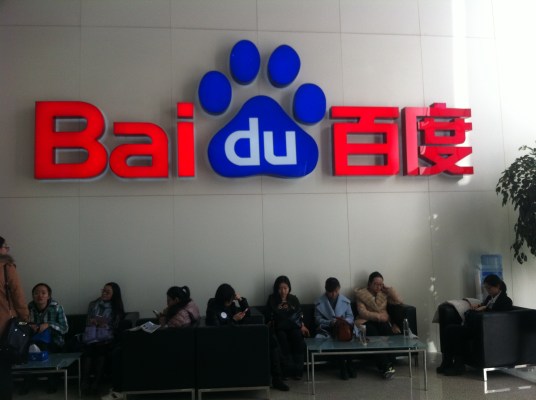China’s Baidu, the company best known for its dominant search engine, said today that it will invest more than $3 billion in its online-to-offline businesses over the next three years.
Update: Baidu has confirmed that the entire sum will be invested in Nuomi. The service spans various Baidu services, but it’s worth noting that the focus is connecting merchants and consumers via Nuomi.
The company, which is going through something of a transition after recently posting its slowest revenue since 2008, is putting 20 billion RMB (that’s just over $3.2 billion) in a range of different services including Nuomi, a platform that matches merchants with customers which it bought from once-red-hot Chinese social network Renren last year.
Nuomi started out as a group buying site, but it’s fair to say that the service has grown beyond that description today. Baidu claimed it has over 650,000 stores from across 330 cities in China. The firm said Nuomi processes close to 2 billion RMB (approximately $320 million) per month, and it is aiming to make it operational in all cities in China before the end of 2015.
In addition to aggressive expansion plans — Baidu projected that Nuomi will become the second highest grossing group sales app before the year is out — Nuomi is launching a new “membership plus” service that gives merchants a range of new tools to super charge their business and relationships with customers via Nuomi.
One part of that is an integration between Nuomi’s membership system and merchant’s point of sale systems which allows users to pay for goods using a virtual card inside the app. Other integrations will allow merchants to push offers and deals to users who subscribe to their store — facilitating a more direct relationship than merchants enjoy through group buying or location services like Yelp. Baidu also confirmed to TechCrunch that it will offer a series of services powered by its big data technology, such as a feature that assesses customer and location data to help chain stores plan the physical location of future retail outlets.
The $3.2 billion is not only for Nuomi’s development. Baidu will use the money for other parts of its online-to-offline ecosystem, which includes ‘light apps’, its popular Baidu Maps service, food on-demand, and related projects such as indoor GPS — the company invested in Finnish firm IndoorAtlas last year — and public WiFi.
In addition, a Baidu spokesperson told TechCrunch that an undisclosed portion of the money has been set aside for M&A deals to develop its focus on “connecting people with services.”
Baidu — which allows users to hail Uber taxis directly from its maps service, as part of its strategic investment in the U.S. firm — has seen the rise of mobile internet cut into its financial performance, but founder and CEO Robin Li said in a statement that online-to-offline is a key trend for the firm and its future.
“I took a look yesterday, and right now Baidu has over fifty billion RMB in cash on its books,” Li said. “We’re going to take 20 billion of that and do Nuomi right.
“Going from connecting people with information to connecting people with services is a major transition,” he added. “Such a transition requires determination, and it comes with costs. When we’ve determined to undertake something new, and it becomes the company’s priority, we focus the whole company’s attention into it.”
With more people going online via mobile than desktops in China, Baidu isn’t alone in organizing the physical world via the internet. Rival Tencent has long focused its WeChat messaging service on developing its online-to-offline, working with retailers, taxi app companies and other third parties to integrate services right into the WeChat app.
Alibaba, too, has invested big in this area. Last year the e-commerce giant shelled out $695 million for a 35 percent stake in physical retail firm Intime to form a joint venture focused on connecting online and offline commerce. Just last week, Alibaba and its Ant Financial subsidiary revealed plans to invest $1 billion into a new online-to-offline joint venture called Koubei.
Finally, Tencent and Baidu have actually joined forces — alongside conglomerate Wanda — to create a joint company which, among other things, is focused on online-to-offline, payments, and more.
Given that Uber appears to be seeing more success in China than many people gave the company credit for — the U.S. firm claims one million rides per day in China — it will be interesting to see whether Baidu has further collaborations with the company planned as part of its online-to-offline push. Watch this space.
